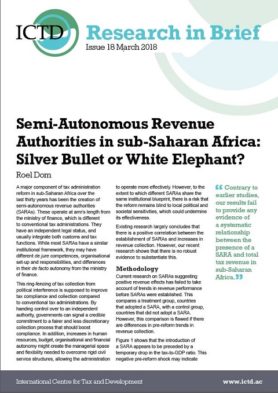Research in Brief 18
A major component of tax administration reform in sub-Saharan Africa over the last thirty years has been the creation of semi-autonomous revenue authorities (SARAs). These operate at arm’s length from the ministry of finance, which is different to conventional tax administrations. They have an independent legal status, and usually integrate both customs and tax functions. While most SARAs have a similar institutional framework, they may have different de jure competences, organisational set-up and responsibilities, and differences in their de facto autonomy from the ministry of finance. This ring-fencing of tax collection from political interference is supposed to improve tax compliance and collection compared to conventional tax administrations. By handing control over to an independent authority, governments can signal a credible commitment to a fairer and less discretionary collection process that should boost compliance. In addition, increases in human resources, budget, organisational and financial autonomy might create the managerial space and flexibility needed to overcome rigid civil service structures, allowing the administration to operate more effectively. However, to the extent to which different SARAs share the same institutional blueprint, there is a risk that the reform remains blind to local political and societal sensitivities, which could undermine its effectiveness. Existing research largely concludes that there is a positive correlation between the establishment of SARAs and increases in revenue collection. However, our recent research shows that there is no robust evidence to substantiate this.
